Shakespeare performed in Windsor Castle by Royal Command
The poetry & the sense in every line are admirable & make one wonder at the immortal man, who could in the 16th century write such sense & nonsense, which cannot be approached nowadays. - Queen Victoria, writing in her diaries following a performance of As You Like It (1851)
The long-reigning monarch could be a harsh critic when it came to reviewing performances of Shakespeare given at the Royal palace, as these extracts from her diaries show.
But she was also happy to heap praise on acting she'd enjoyed, especially that of actor-manager Charles Kean who seemed a particular favourite.
-
![]()
Much ado near me
Hear more Shakespeare stories on BBC Radio Berkshire
-
![]()
Shakespeare Festival 2016
The BBC celebrates the genius of the bard
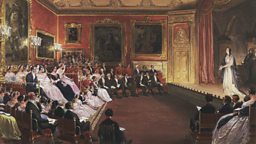
It was a performance of Macbeth fit for a monarch.
Between 1848 and 1861 a series of private theatricals took place in front of Queen Victoria, Prince Albert and their young family at Windsor Castle. Shakespeare was a popular choice and the Master of the Revels was the leading actor-manager of the day, Charles Kean, who alongside other stars from the London stage, appeared in these productions. All the fascinating details are revealed in the young Queen’s journals.
Shakespeare was on the bill fifteen times, far more than any other playwright, and in this lovely watercolour (from the Royal Collection Trust) you can see the Queen and her husband watching a performance of Macbeth. The play was staged in the Rubens Room, a more intimate space than some of the other places in the Royal residence that were used, and this room has now become the King's Drawing Room.
In front of the monarch, sitting obediently in a row are the Royal children whose eyes are transfixed by the actress centre-stage. This is likely to be Lady Macbeth in one of her most dramatic scenes.
She is played by the great Victorian actress Ellen Tree, who was the wife of the director, Charles Kean. The duo dominated the London stage at the time and Kean was renowned for his epic productions of Shakespeare, with enormous casts, elaborate scenery and meticulous attention to historical detail.
As Master of the Royal theatricals, he was placed in charge of entertainment in the Royal household until the late 1850s and he and his wife would often star in these productions. It was a role he held alongside that of director of the Princess’ Theatre in London.
There is also the playbill from that particular performance on Friday 4th February, 1853. This bill is beautifully illustrated with roundels showing scenes from Macbeth, and depictions of the witches’ “familiars” in the form of a snake, a cat, and a strange frog-like creature adorning the base of the pillars.
Both painting and playbill can be seen in a special exhibition at Windsor Castle marking the 400th anniversary of the death of William Shakespeare which is open until the beginning of 2017.
These private performances were recorded by Queen Victoria in her personal journal and can be accessed online. Her writing offers a fascinating and intimate insight into what the 28-year-old thought about the performance of Macbeth featured here, as well as details of other plays, famous performers and those who attended.
Here are some extracts from Queen Victoria’s journals:
Hamlet – Thursday January 11th 1849
The Ghost I thought a failure, as he wailed so, & was so feeble.
The 4 eldest Children came after dinner, remaining at the Performance part of the time. Shakespeare's "Hamlet" was given, Charles Kean acting that part beautifully, which is one of his best. I saw him in it 9 or 10 years ago. Mrs Kean acted the mad scene most touchingly & in the greatest perfection. The Ghost I thought a failure, as he wailed so, & was so feeble. Mr Wigan did the fop exceedingly well, but it is hardly a part. The scenery was beautiful, & everything was so well carried out. The whole Play was so impressive, from not a word being lost. The trumpets & drums at the last, have a very solemn effect. The grave digger scene was left out. Kean, though small, & not handsome is extremely graceful in all his actions. — Amongst the company present was that beautiful Mrs Peter Wills, whom we admired so much at the Drawingroom.
Julius Caesar - Friday 1st February 1850
The 4 eldest Children were in the Drawingroom when we came out of dinner.
The part of JuliusCaesar was very fairly acted by Mr C. Fisher, a very tall, good-looking man, with a very classical head.
We went over to the Waterloo Gallery shortly after 8. Shakespeare's "Julius Caesar" was given, such a finely written Tragedy, full of beautiful & celebrated speeches. The part of JuliusCaesar was very fairly acted by Mr C. Fisher, a very tall, good-looking man, with a very classical head. The 2 principal characters of Brutus & Marcus Antonius were performed by Macready & C. Kean, & Cassius & Cassia, very well, by J. Wallack & Cooper.
Kean's acting was quite perfection, & he gave the celebrated speech in the Forum, admirably Poor Macready, I thought not good, ranting too much, & being so affected in manner, — his voice cracking & gulping, & having an unpleasant way of stopping between every word.
The quarrelling scene with Cassius was the only one, in which he acted well. The 2 women Mrs Saville & Mrs Warner were decidedly bad. The whole went off extremely well, & the "mis en scène" was very good. I sat during the Performance, between the Grand Duchess & Marie Douglas. The Children remained the whole time only Affie leaving earlier. —
King Henry the Fourth (Part 1) – Thursday December 12th, 1850
We dined at 7, — the same party as yesterday, only without Mama, & with the addition of Ld Liverpool, who stays over Sunday. We had our 1rst Dramatic Performance which was very successful. It was Shakespeare's "Henry IVth", with some of the parts somewhat expunged & compressed. As an previous occasions, the Performance took place in the Rubens Room.
The dresses & armour beautiful, & the whole Play very fine.
Bartley acted the part of Falstaff, which is a very difficult & arduous one, — admirably; Keane excellent as Hotspur, — Mr Anderson rather heavy as Henry Pce of Wales, but all the other parts were very well performed, down to the smallest. The dresses & armour beautiful, & the whole Play very fine. Mama & her people joined us for the Performance, & many of the neighbours, &c. — were invited. Lenchen appeared for the 1rst time, remaining for the 1rst act, & the 2 eldest, for the whole. —
As You Like It - Friday 31st January 1851:
The older Children joined us at 8 there was a Performance of "As You Like It", very well acted, with but 2 exceptions. Mr Wigan was perfect, the Keanes excellent & the Keeleys quite delightful. The poetry & the sense in every line are admirable & make one wonder at the immortal man, who could in the 16th century write such sense & nonsense, which cannot be approached nowadays. Still as a performance, I thought it rather heavy.
Twelfth Night – Friday January 9th 1852
Our dinner was at 7, on account of the Theatrical Performance that was to follow. Shakespeare's "Twelfth Night" was given & extremely well performed. Kelley Bartley & Harley were delightful & the whole caste was extremely good. All our people & their families, members of the garrison & neighbours were invited
Macbeth – Friday 4th February 1853:
Little Arthur came in to dinner and the 6 other Children afterwards. We went over to the Rubens Room, after 8, & Shakespeare's splendid Tragedy of "Macbeth" was extremely well given. The scenery, including the Cave or Cauldron scene with the apparitions, was admirably managed, & the dresses beautiful, & most correct. Both Keans acted very well, but she in particular. It is a most interesting, thrilling, & heartrending play. Ld Aberdeen & Ld Carlisle, both great connoisseurs of Shakespeare, were much pleased.

Elizabeth Clark (Royal Collection Trust) delves further in to Queen Victoria's diary entries
Credit: The Royal Archives/© Her Majesty Queen Elizabeth II 2016
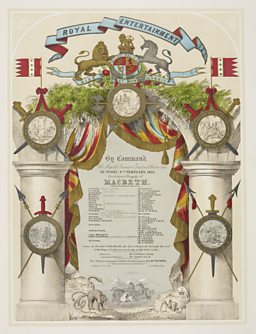
About Shakespeare on Tour
From the moment they were written through to the present day, Shakespeare’s plays have continued to enthral and inspire audiences. They’ve been performed in venues big and small – including inns, private houses and emerging provincial theatres.
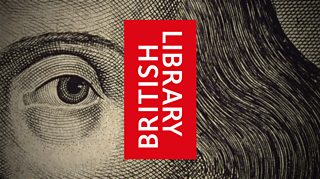
BBC English Regions is building a digital picture which tracks some of the many iconic moments across the country as we follow the ‘explosion’ in the performance of The Bard’s plays, from his own lifetime to recent times.
Drawing on fascinating new research from Records of Early English Drama (REED), plus the British Library's extensive collection of playbills, as well as expertise from De Montfort University and the Arts and Humanities Research Council, Shakespeare on Tour is a unique timeline of iconic moments of those performances, starting with his own troupe of actors, to highlights from more recent times. Listen out for stories on Shakespeare’s legacy on your BBC Local Radio station from Monday 21 March, 2016.
You never know - you might find evidence of Shakespeare’s footsteps close to home…
Craig Henderson, BBC English Regions
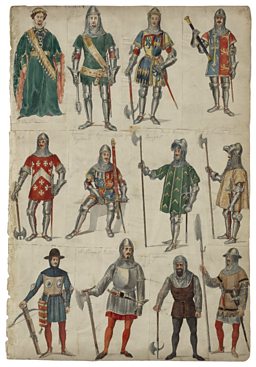
Related Links
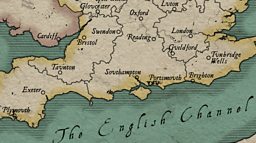
Shakespeare on Tour: Around Berkshire
-
![]()
Mr Holmes keeps the fires burning bright for Hamlet
Newbury and Speenhamland audiences flock to the theatre
-
![]()
Reading child prodigy retires
W.R. Grossmith says farewell at 11
-
![]()
Reading’s Puritans turn away Shakespeare
Shakespeare's men paid not to play in Reading
Shakespeare on Tour: Around the country
-
![]()
The 18th century impersonator who was 'the Jon Culshaw of his day'
The city gets its prestigious Theatre Royal
-
![]()
The Northampton Repertory Theatre
Pieces of history in Northampton
-
![]()
Drunken robbers threaten the leader of Shakespeare's players
As he collects admission money at the door!
-
![]()
Shakespeare's tragic heroes appear in Launceston
Size not everything as Shakespeare's tragic heroes appear in remote town of Launceston









